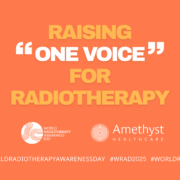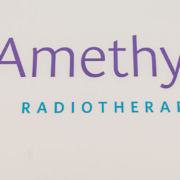Radiotherapy is a cornerstone of cancer care. It plays a vital role in controlling disease, relieving symptoms, and improving outcomes for patients across the world. Despite its clinical effectiveness and cost-efficiency, access to radiotherapy remains unequal—particularly in low-resource regions—and wider public awareness of its benefits continues to fall short.
In response to this global challenge, the international oncology community has launched World Radiotherapy Awareness Day (WRAD) – a new initiative to promote greater visibility for radiotherapy, address inequalities in access, and encourage collaboration across healthcare systems and borders.
As a pan-European provider of radiotherapy services, Amethyst Healthcare Group supports this timely and necessary campaign. WRAD was formally introduced during London Global Cancer Week 2024, where Amethyst Radiotherapy UK participated as one of several healthcare organisations contributing to the event. We are proud to be listed among the contributing representatives on the official WRAD website, reflecting our shared commitment to promoting awareness, education, and access in the field of radiotherapy.
The Aim of WRAD
World Radiotherapy Awareness Day was created to bring together professionals, advocates, and institutions around a common goal: to ensure radiotherapy is fully recognised and supported as a vital component of cancer care. While it is widely used and clinically proven, radiotherapy remains underrepresented in national cancer plans, policy frameworks, and funding priorities.
WRAD seeks to change that, with four key objectives:
- Raising awareness of radiotherapy’s essential role in modern oncology
- Promoting equity in access to safe, effective radiotherapy worldwide
- Encouraging investment in infrastructure, workforce development, and innovation
- Uniting stakeholders through a coordinated global advocacy platform
The campaign’s guiding theme “One Voice for Radiotherapy” will shape outreach and engagement over the next three years.
A Collaborative Launch at London Global Cancer Week
WRAD was officially launched in November 2024 at Conway Hall, London, a venue with historic ties to UK healthcare. The event brought together global health leaders, clinicians, advocates, professional societies, and industry partners to shape the campaign’s vision.
Amethyst Radiotherapy UK was pleased to attend and support the launch, marking the start of a global initiative to elevate radiotherapy’s profile. Our inclusion among WRAD contributors reflects Amethyst Healthcare Group’s broader commitment to quality, innovation, and patient-focused care.
Notable contributions included Solomon Kibudde of the Uganda Cancer Institute, speaking on behalf of African Organisation for Research and Training in Cancer (AORTIC), who underscored the urgent need to reduce disparities in radiotherapy access and highlighted WRAD’s potential as a unifying platform for progress. With over 800 participants joining both in person and online, the launch helped define WRAD’s identity, resources, and international engagement strategy.
Looking Ahead to September 2025
The first official World Radiotherapy Awareness Day will be observed on 7 September 2025, commemorating the day the first patient was treated using a linear accelerator.
In the months leading up to this date, the WRAD campaign will focus on:
- Launching a dedicated website and social media channels
- Providing toolkits and educational materials for institutions and clinicians
- Expanding engagement through key conferences and awareness events
WRAD is envisioned as a long-term, inclusive initiative – encouraging participation from across the oncology spectrum, including healthcare providers, researchers, patient groups, policymakers, and industry leaders.
What This Means for Amethyst Healthcare Group
At Amethyst Healthcare Group, our vision is to help patients fight cancer through the integration of expert-led treatment, state-of-the-art radiotherapy, and truly personalised care. With a presence across Europe, we combine technological excellence with local expertise to deliver safe, timely, and compassionate oncology services. Our support for World Radiotherapy Awareness Day reflects this commitment. WRAD aligns with our mission to raise awareness, reduce disparities, and advance equitable access to high-quality cancer care. By joining this global initiative, we reaffirm our values: patient-centricity, clinical innovation, public partnership, and an unwavering dedication to improving outcomes across the cancer pathway.
Your Voice Matters
World Radiotherapy Awareness Day is a global call to action—bringing together clinicians, organisations, and communities to highlight the value of radiotherapy in cancer treatment.
To get involved, visit www.worldradiotherapy.org and sign up for campaign updates and resources. Save the date: 7 September 2025, and join us in supporting the campaign to raise One Voice for Radiotherapy.











